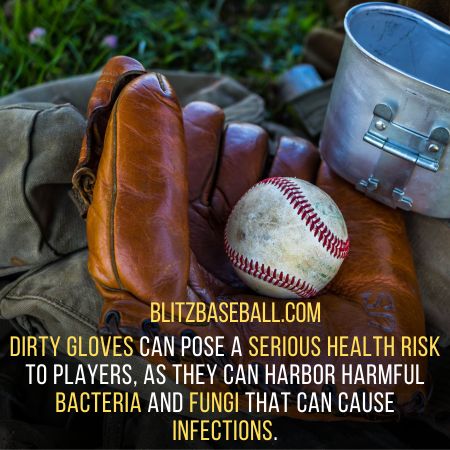Baseball players rely heavily on their equipment to perform their best, and batting gloves are no exception. These gloves not only provide a better grip but also protect the hands from the impact and vibration of the bat during matches.
However, dirty gloves can pose a serious health risk to players, as they can harbor harmful bacteria and fungi that can cause infections and unpleasant smells.
Therefore, players must take the necessary steps to keep their gloves clean and hygienic.
In this article, we will provide essential tips on how to clean baseball batting gloves of both leather and synthetic materials.
We will highlight the importance of cleanliness and explain the cleaning process for each type of glove, including recommended cleaning products and techniques.
By following these tips, players can ensure that their batting gloves remain in top condition, providing the necessary grip and protection during matches while also minimizing the risk of infections and unpleasant odors.
Key Takeaways
- Keeping batting gloves clean is important for hygiene and to prevent infection caused by bacteria from sweat, dust, and mud.
- The cleaning process for leather and synthetic gloves differs, and gloves should be completely dry before storing them in a cool and dry environment.
- Harmless cleaning chemicals like Lexol Cleaning Agent, Horseman One-Step, and Dr. Glove Cleaning Chemical can be used to clean gloves, and antibacterial denture cleanser tablets can be added to water to remove bad smells from gloves.
- Regular cleaning of batting gloves can help them last longer, provide better grip, and protect the hands from infection, and proper use and cleaning processes are essential for baseball players.
Significance of Cleanliness

Maintaining the cleanliness of baseball batting gloves is crucial to prevent the growth of harmful bacteria and prolong the lifespan of the gloves.
Pre-existing knowledge highlights the potential health risks associated with dirty gloves and the recommended cleaning methods for different types of materials.
Dirty gloves can be a breeding ground for bacteria and fungus, which can lead to infections and unpleasant smells.
Additionally, dust, mud, and sweat can produce bacteria and cause infections, making the proper cleaning and storage techniques essential for players.
Proper storage techniques involve keeping gloves in a dry and cool environment and avoiding storing them in a small bag with other equipment.
Clean gloves provide a better grip and protect from vibration during matches. Moreover, cleaning gloves can help them last longer and protect players’ hands from infection.
How to Clean Baseball Batting Gloves?

Regular cleaning of batting gloves can prevent unpleasant smells and help them last longer. Therefore, it is crucial for baseball players to maintain cleanliness and follow the recommended cleaning and storage techniques for their gloves.
Cleaning Process for Leather Gloves
When caring for leather baseball gloves, it is essential to use appropriate cleaning agents that are safe for leather. Some of the commonly used cleaning agents for leather gloves include:
- Lexol Cleaning Agent
- Horseman One-Step
- Dr. Glove Cleaning Chemical
- Goo Gone
These agents can help remove dirt, sweat, and other impurities from the gloves, leaving them clean and hygienic.
To clean the gloves, turn them inside out to clean the inside and use a lukewarm water and alcohol-free detergent solution.
Avoid using hot water or bleach detergent as this can damage the leather and cause discoloration.
Proper storage techniques are also crucial for maintaining the cleanliness and longevity of leather batting gloves. After cleaning, air dry the gloves thoroughly before storing them in a dry and cool place.
Avoid storing them in a small bag with other equipment as this can cause the gloves to lose their shape and become misshapen.
Additionally, using disposable leather cleaning pads can help clean the gloves softly and prevent damage to the leather material.
By following these cleaning and storage tips, baseball players can ensure that their gloves remain clean, hygienic, and long-lasting.
Cleaning Process for Synthetic Gloves
Synthetic gloves require a specific cleaning process that should be followed to ensure the longevity and cleanliness of the gloves. The first step is to check the label for any specific care instructions.
If the label allows, the gloves can be washed in a washing machine, but hot water and bleach detergent should be avoided. Instead, use cool water and a mild detergent that is free of alcohol.
It is also recommended to add an antibacterial denture cleanser tablet to the water to remove any bad smells from the gloves.
After washing, the gloves should be air-dried to prevent any damage to the synthetic material.
It is important to note that some harmful chemicals can damage synthetic gloves. Therefore, it is necessary to use cleaning agents that are specifically designed for synthetic gloves.
Some of the recommended cleaning agents are Dr. Glove Cleaning Chemical, Goo Gone, and Horseman One-Step. These chemicals can help remove any dirt or stains from the gloves without causing any damage.
Additionally, it is important to avoid using any abrasive materials that can scratch or damage the synthetic material.
By following these cleaning instructions, synthetic gloves can remain clean and hygienic, providing better grip and protection from vibration during matches.

Frequently Asked Questions (FAQs)
Are there any specific cleaning methods for batting gloves made of a combination of leather and synthetic fabric?
Cleaning hybrid batting gloves made of synthetic leather requires a gentle approach. Use a stain removal cloth, safe-for-leather cleaners, and a dry leather brush. Turn gloves inside out to clean the inside, use lukewarm water, and air dry.
Follow the instructions on the label to determine if machine washing is suitable. Avoid hot water and bleach detergent, and use an antibacterial denture cleanser tablet to eliminate bad smells.
Can using harsh chemicals to clean batting gloves damage the material?
Using harsh chemicals to clean batting gloves can damage the material. It is recommended to use gentle cleaning methods and opt for the best alternatives to harsh chemicals, such as safe-for-leather cleaners or antibacterial denture cleanser tablets.
How often should batting gloves be replaced, even with regular cleaning?
Batting gloves should be replaced when they show signs of wear and tear, such as holes or excessive stretching. Proper storage is important to prolong their lifespan. Regular cleaning can help prevent the need for replacement.
Can putting batting gloves in a dryer cause damage to the material?
Using a dryer to dry batting gloves can cause damage to the material, specifically to the leather. Alternatives to using a dryer include air drying, using a towel to absorb excess moisture, or using a low-heat setting in the dryer.
Are there any natural methods for cleaning and deodorizing batting gloves?
Natural cleaning methods and DIY deodorizing techniques for baseball batting gloves include using a mixture of vinegar and water or baking soda and water to clean and remove odor. Air drying after cleaning is recommended.
Conclusion
In conclusion, maintaining clean and hygienic batting gloves is crucial to ensure the safety and performance of baseball players. Dirty gloves can harbor bacteria and fungus, leading to infections and unpleasant odors.
Therefore, it is essential to clean gloves regularly using appropriate methods, depending on whether they are made of leather or synthetic materials.
For leather gloves, cleaning involves using a damp cloth and mild soap to remove dirt and sweat. The gloves should be allowed to air dry and conditioned with a leather conditioner to maintain their suppleness.
On the other hand, synthetic gloves require a different cleaning process, such as using mild detergent and warm water to scrub off dirt and stains, followed by air drying.
By following these essential tips, players can ensure their batting gloves remain clean and hygienic, enhancing their grip and protection during matches to score better ERA or WHIP. It is advisable to clean gloves after every use and store them in a cool, dry place to prevent the growth of bacteria and mold.
Overall, maintaining clean and hygienic gloves is a simple yet crucial aspect of playing baseball that should not be overlooked.
